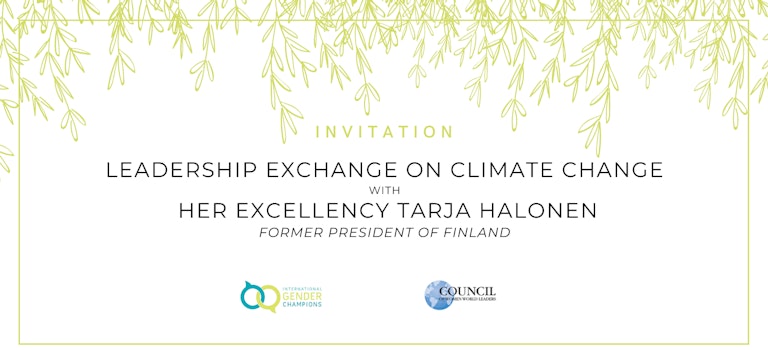On 21 October 2021, the Council of Women World Leaders and International Gender Champions co-hosted a leadership exchange with the former President of Finland and a member of the Council of Women World Leaders, Tarja Halonen.
The session, which took place in the lead up to COP26 in Glasgow, was opened by moderator Ambassador Chad Blackman, Permanent Representative of Barbados to the United Nations and other international organisations in Geneva and IGC Global Board member. He delivered a powerful address stating that climate change will exacerbate existing inequalities and disproportionately impact marginalised communities, particularly women and girls. Ambassador Blackman indicated that gender equality and climate change should not be seen as mutually exclusive but rather a win-win opportunity.
When asked how Her Excellency made climate change a priority and galvanised political will and resources to address ‘tomorrow’s problem today,’ Her Excellency responded by saying, “there is a real need to trust the scientific evidence.” Her Excellency made it clear that the decisions we as a society make today impact the future that will soon be beyond our control. Both Ambassador Blackman and Her Excellency acknowledged that “evidence is key” when it comes to encouraging political change.

Her Excellency was also asked how she most effectively bridged the climate change and gender equality nexus. She answered that her approach to bridging this divide was generated through multilevel implementation. She stressed the need for collective action from the UN, international organisations, national leaders, and NGOs while understanding that policies need to be both culturally and regionally specific. She also mentioned that civil society has a place in helping bridge the divide. Her Excellency noted that women usually take on a more caring role in society, whether that be with familial matters or informal labour. She believes that “women are powerful agents of change” and gender-responsive approaches are a catalyst for long-lasting climate interventions.
In reference to gendered economic commitments, the Action Coalition on ‘Feminist Action for Climate Justice’ called for financial commitments in the form of “88% in the proportion of marked climate bilateral finance targeted towards gender.” Her Excellency mentioned that the effects of the COVID-19 pandemic can be compared to a magnifying glass – showing and amplifying the existing societal problems, especially the disparities primarily affecting women and girls. It is not a question of whether we can achieve the financial commitments required to overcome these inequalities, but how we can. For sufficient financial buy-in to be, Her Excellency believes that women’s participation and leadership is vital. She said that women and “modern men,” or men who are allies in the struggle to achieve gender equality, should make up more than 50% of the majority in conversations relating to gendered climate approaches and solutions.
The session ended with Ambassador Blackman emphasising four critical objectives to achieving the “win-win” opportunity of bridging climate change and gender equality:
- Scientific climate data compels us to respond and engage with all sectors – public, private, civil society – in order to build and mobilise a coalition of the willing.
- We need more data to correctly manage our resources for gender budgeting, green budgeting, and more gender-just responses.
- Ambitions to mitigate the climate crisis are there globally. Still, to move to implementation and action at every level, women and girls must play a critical role as activists and leaders.
- We need to continue to overcome the barriers of inequality, such as gender-based violence, which affects women in all spaces in society – including women climate activists. – Equal legal rights, visibility and access to education are critical to levelling the playing field and optimising the potential of a global response to the climate crisis.
Hosted as part of the Nest Fund, which is a temporary, informal “network of networks,” focused on groups of senior-level women leaders from government, business, philanthropy, and media, as well as key allies and male champions convened by the United Nations Foundation (UNF) Girls & Women team, in partnership with the Bill & Melinda Gates Foundation. The Nest creates a high-level network to raise and amplify key Generation Equality commitments made at UN Women’s Generation Equality Forums in Mexico City and Paris in 2021.
The goal of this leadership exchange was to highlight one of the six Action Coalition goals established at the Generation Equality Forums: to “deliver tangible impact on gender equality and girls’ and women’s human rights.” With her longstanding commitment to reversing climate change at its current pace, Her Excellency Tarja Halonen spoke to the Action Coalition theme of feminist action for climate justice. Her Excellency enforced strict climate policy during her time in office, making Finland only the third country on track to achieve carbon neutrality by the year 2035. Her Excellency continues to promote issues related to sustainable development in her many other roles, including as a member of Sustainable Development Solutions Network’s Leadership Council and as a member of the WHO Pan-European Commission on Health and Sustainable Development.

